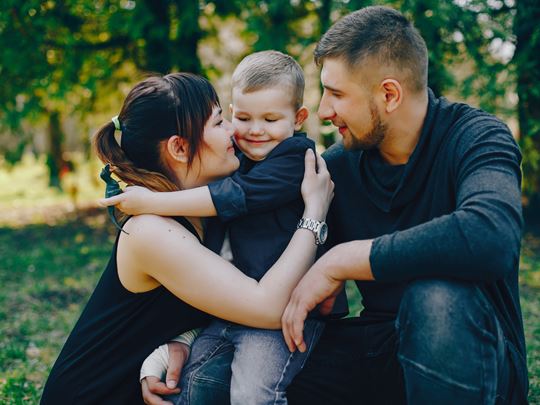
You’ve been through a lengthy process to become a foster parent and now the moment you’ve been waiting for is actually here. Will they settle in comfortably? What if they don’t listen to me? How can I connect with them?
These are all very normal thoughts to have before the first time meeting your foster child.
For many foster children, they’ve experienced broken family dynamics and can find it difficult to trust the adults around them. That’s why going at their pace is absolutely key to establishing a strong, meaningful bond. Unlike with birth children where you often show love through tactile gestures such as hugging and kissing, a lot of children in care won’t be receptive to this kind of attention. However, that’s not to say your foster child isn’t capable of showing affection.
It can just take time to get there. Sometimes physical affection is appropriate and sought after by the child, however, in many cases, they’re not ready for that kind of affection, which is completely understandable. It’s about following their lead and learning what they’re comfortable with, which can change over time.
With Orange Grove, you’ll have a dedicated social worker to help you assess and discuss situations like hugging and holding hands. But there are other ways to bond with your first foster child that will ensure they feel safe, secure and loved.
With that in mind, here are 5 ways to bond and build trust when you’re welcoming your first ever foster child into your heart and home.
1. Find out their likes and dislikes
Before meeting your foster child for the first time, try to discover as much as possible about them from the fostering agency or local authority. You could find out their favourite meals and have a few options ready for when they first arrive. That way, they can choose their first dinner in their new home, giving them a sense of freedom they might not have felt before. Or if they’re passionate about a certain TV programme, toy or cartoon character, you could buy related items and present them as a gift on the first day. It’s a small gesture that will show your new foster child you’ve taken the time to get to know them and want them to feel at home.
2. Slow and steady wins the race
You may feel tempted to plan a whole itinerary of activities or host a welcome party with all the family, but big, grand gestures can be extremely overwhelming and jarring. A lot of foster children will have come from abusive homes or have had to deal with harrowing experiences. They need a safe, calm environment where they can take time to process their new home and the new people they’ll be living with. The first meeting with a foster child is a big moment for everyone involved, so take it slow and let them know they don’t have to do anything they don’t want to. If they do want to engage with you, pick up on those cues and be ready whenever they are.
3. Get creative in the kitchen
Cooking together is a great bonding activity, and what's more, you get some tasty treats at the end of it too! While it’s important not to overwhelm your first foster child during their first few days with you, if they’re receptive and seem keen to join in activities, dust off the aprons and get cooking. You could bake a cake to celebrate welcoming your first foster child into your home. Not only is it fun to cook together, but it’s also a good way to get young people to open up and communicate. Children can feel more relaxed and less defensive when they’re joining you side by side, as opposed to being directly opposite, which can be intimidating. You’ll also be able to get an idea of what social skills they already have and what might need working on, such as sharing, taking turns or listening to directions/rules.
4. Make a welcome pack
A welcome pack is a great way to help your first foster child settle and show them how much you care, without involving any actual contact or engagement. This is a good way to help children who are particularly anxious or withdrawn due to their difficult past. First meeting a foster child may be daunting for you, but for them, it can actually be quite scary. There are many cases where foster children have simply wanted to retreat to their new bedroom and not speak to anybody. Having a welcome pack waiting for them will help them settle in, at least from a practical point of view. You could include new pyjamas, clothes, toiletries and accessories to decorate their bedroom. Many children in care won’t have that many possessions, so it could be a nice surprise to have a hamper of goodies waiting for them in their new home.
Another idea for the welcome pack is a welcome book. This is where you include details about you, your family, any pets, your home and the local area. Fill it full of photos of your family and any other close family and friends who visit often so they can start to recognise people. It’s a lovely way to allow your new foster child to get to know you, even if they’re not ready to engage with you just yet.
5. Shower them with praise and encouragement
One of the best ways to bond with your first foster child is to show you’re committed to fighting their corner and being their biggest advocate. Chances are, they’ll have been let down by the adults in their life and haven’t experienced consistent love or parenting. This can make them act out, press your buttons and push boundaries. They want to test you to see if you’ll stay, even at their worst. You need to demonstrate that whatever they do, you’ll still be there for them. Being patient and resilient are key qualities of a great foster parent, so remember to always be the solid beacon of calm that many foster children are looking for during times of darkness.
Are you excited at the thought of welcoming your first foster child into your home? Start your fostering journey today with Orange Grove. Get in touch for an informal chat where you can learn more about the role of fostering and how we support both our foster parents and the children in our care.
Can't find what you're looking for?
By phone
One of our team is available to talk to you over the phone to answer any of your fostering queries.
Enquire online
You can get in touch by filling out our online enquiry form with any queries that you may have.
Your local office
We have local teams covering most of England. Find your local office today.





